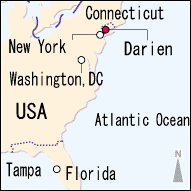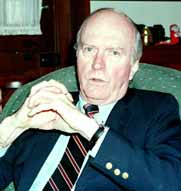April 12, 2000
  Robert Newman: "If we abandon our veterans,
young people will stop joining up."
(Darien, Connecticut) Robert Newman: "If we abandon our veterans,
young people will stop joining up."
(Darien, Connecticut) |
| Serious health poblems Inadequate treatment and compensation |
Fifty minutes northeast from New York by train, I get off at the unmanned station at Darien, Connecticut, and am greeted by a genial Robert Newman (69) carrying the umbrella I was to look for.
"I promised to work as an aide to Congressman Shays for two years to study the Gulf War veterans' health problems. It's been five years now and I'm still commuting between here and Washington." Newman tells me this with feeling as he drives the short distance to his home.
It was 1995 when Christopher Shays (54), the Republican congressman from Newman's district, was elected to chair a subcommittee on "Security, Veterans Issues, and International Relations," and asked Newman, a retired journalist, to help him.
"The Congressman was receiving a disturbing number of letters and e-mails from sick veterans in his district complaining that, when trying to get treatment at Veterans' Hospital, they were told, 'It's all in your head.' They weren't getting any help."
It was hard to believe that veterans, who had given so much to their country, were being treated this way. Angered, Congressman Shays turned to his friend Newman for help. "I want my subcommittee to hold hearings and find out what's going on. Please help me with this investigation." Newman, a Korean War vet, accepted immediately.
In March 1996, they invited the veterans themselves to the first hearing, which was followed by 14 more over a period of 20 months. During that time the committee heard testimony from more than fifty veterans with illnesses, as well as family members, doctors, nuclear physicists, chemists, and experts in a variety of fields.
"These hearings were quite revealing. For one thing, we learned that the medical records of nearly all the veterans had disappeared." Records that had been entered into computers were sent in hard disks to the Military Record Center in Tampa, Florida. For some reason, they were all lost.
Without medical records from their time in service, it was impossible to establish the cause of the current illnesses. As a result, veterans were frequently turned away at the door of VA hospitals.
"For the five years or so that it took Congress to launch this investigation, the Defense Department and Veterans'Admininstration took their time responding to veterans who sought treatment or compensation. In the end, the requests were refused. At best, they took folks in but insisted the symptoms were just due to stress." As he learned more, Newman found himself unable to pull himself away from this work.
As they listened to the testimony of veterans and scientists, the 14 Republican and Democratic congressmen and women serving on the subcommittee became convinced of two things. 1) The veterans' illnesses were caused by radiation or chemical substances they encountered in the course of their service such as PB and the untested vaccines they were forced to take, and 2) the federal government was treating those veterans badly. The subcommittee report led to the passage of two laws the following year, in October 1998.
"The gist of those laws is this. One stipulates that even without medical records the illnesses of Gulf War veterans must be recognized as due to their service in the Middle East, and the Defense Department and the Veterans Administration are required to offer prompt and appropriate treatment and compensation. The other one addresses a right taken for granted with respect to the general public. It prohibits the administration of any experimental drugs to soldiers without their consent."
The enactment of these laws was good news for the veterans and their families, but when it comes to application, Newman laments, "They're absolutely inadequate." This is because full treatment and compensation would mean a vast sum of money.
"My task now is to monitor the Veterans Administration and make sure the laws are properly obeyed." Newman worries that in ten years the incidence of cancer or neurological disorders will climb even higher. "It'll be unforgivable if we just abandon them."
Newman speaks with determination. Behind his words lies the firm belief that "We need to take good care of the people who carry the burden of defending our nation."